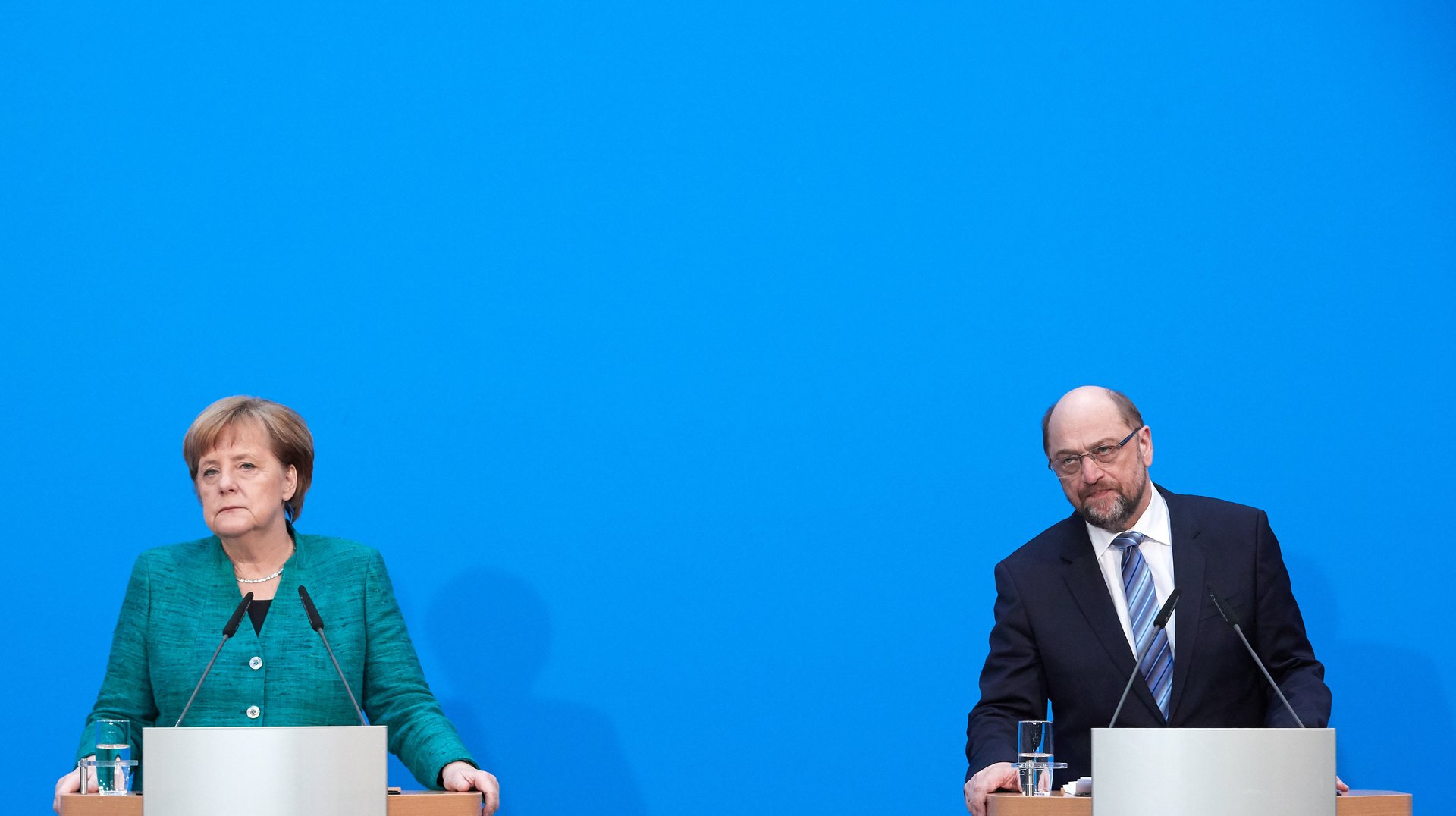Merkel makes major concessions to strike a deal for a new German government
It took more than four months, but Germany finally has a reached an agreement to form a coalition government.


It took more than four months, but Germany finally has a reached an agreement to form a coalition government.
After a failed attempt at a three-way coalition with the Greens and the Liberals, German chancellor Angela Merkel nailed down an agreement with her former partners to enter into what will be the third coalition between her Christian Democrats and the Social Democratic Party overnight (Feb. 7).
The Social Democrats (SPD), burnt from four years as junior partners in the last government, came to the table with much more leverage this time, as Merkel was out of options. She could have headed a minority government, which she didn’t want, and a snap election risked boosting the far-right Alternative for Germany.
Merkel has made some major concessions to get the deal done and secure her fourth term. For one, she handed over the powerful finance ministry to the Social Democrats, noting that it was “hard for the CDU to give it up.”
Germany’s Deutsche Presse Agentur reported that Hamburg mayor Olaf Scholz will head up the finance ministry, which was led by the conservative Wolfgang Schaüble in the previous administration. Scholz will also become vice chancellor.
The SPD will also have the foreign and labor ministries—with SPD leader Martin Schulz becoming foreign minister—as well as the justice, family and environment ministries, which they also had last time around. So what does that leave for Merkel’s CDU? It gets the defense, economy, education, and agriculture ministries.
“Ultimately the CDU secures the prize of a fourth term for Merkel” says Carsten Nickel, managing director at Teneo Intelligence. Nickel foresees no major foreign-policy changes, as this wasn’t such a big theme of the election campaign, noting “ultimately the differences here are differences in tone at best.”
The SPD is keen to deepen EU integration, so the fact that it will hold the finance and foreign ministries will help. An increase in the eurozone investment budget will please French president Emmanuel Macron, who has been waiting patiently for Berlin to emerge from its political limbo and talk about having a joint EU budget and finance minister.
EU Commissioner Pierre Moscovici hailed the coalition news as a “good news for Germany, and also for Europe.”
“The big differences between the previous grand coalition and a new one will be small,” Pepijn Bergsen at the Economist Intelligence Unit wrote in an email to Quartz. “It will attempt to be seen more to reform, both domestically and on the EU level, but the impact of this will be limited.”
It ain’t over yet
The 170-page agreement marks an end to weeks of negotiations, and Merkel said that the tough talks were worth it. At the press conference on today (Feb. 7), she noted that: “First, it builds a government, and a stable government. Second, it thinks about the needs of the people.”
Merkel can’t relax just yet. In early March, the agreement must pass a vote among the SPD’s 460,000 members, many of whom are loath to see the party enter government with the conservatives again. However, with the SPD polling at historic lows, its members are also likely to want to avoid a fresh election.
According to Bergsen, the fact that this will be Merkel’s final term as leader, “means that the political scene will be significantly less stable than in previous years as questions about who will succeed Ms Merkel as the dominant figure on the centre right will become more pressing.”
At a whopping 136 days from the September 2017 election until the government agreement, Merkel holds the record for longest negotiation period since the beginning of the Federal Republic of Germany.